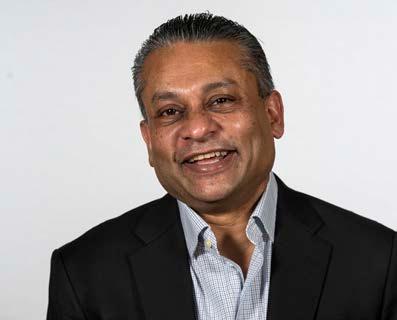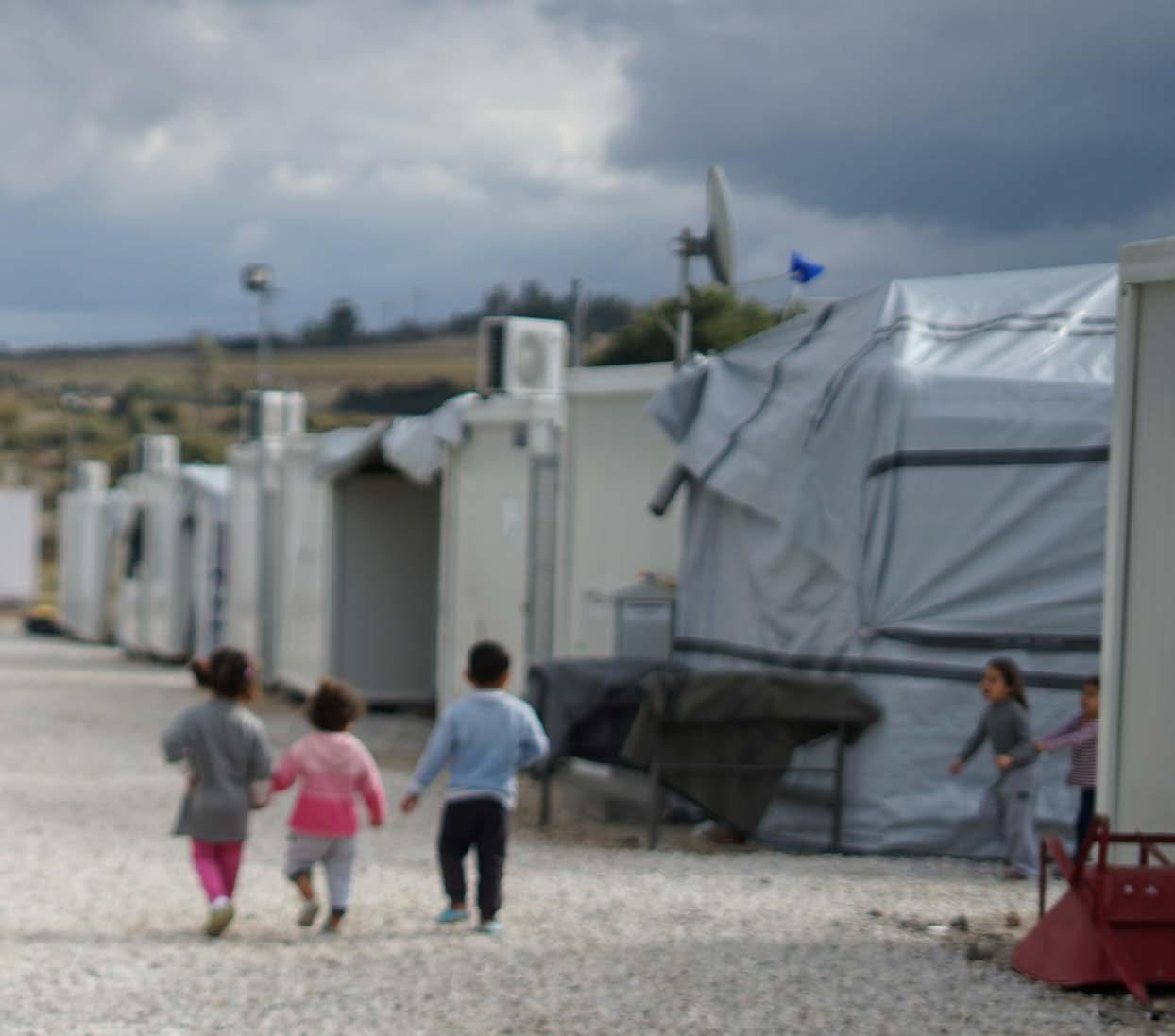
13 minute read
Building on a Human Rights degree - Alumni interview
Interview by Louise Fautley
From his time as a student on the MA Understanding and Securing Human Rights course, to his 25 years of leadership in nongovernmental organisations and the private sector, UoL alumnus Patrick Canagasingham has made it his life’s mission to campaign for human rights.
As the recently appointed Chief Operating Officer of Habitat for Humanity International, Patrick is now playing a lead role in helping create a world where everyone has a decent place to live. Patrick took time from his busy schedule to talk about the work he does with Habitat, the impact of his degree, and his lifelong passion for human rights.
Can you tell me about Habitat’s mission and what role you play in helping the organisation to deliver it?
Habitat for Humanity began as a grassroots effort on a community farm in southern Georgia in 1976. Today, Habitat is a global housing nonprofit serving communities across all 50 states in the U.S. and in 70 countries around the world. Since our founding more than 40 years ago, Habitat has helped more than 29 million people obtain a safer place to sleep at night, along with the strength, stability and independence to build a better future for themselves and their family. I have long admired the work that Habitat for Humanity does in communities around the world, and am happy to now lead Habitat operations in the U.S. and abroad.
Can you share some of the most recent projects or campaigns the organisation has undertaken?
Habitat recently launched a first-of-its-kind global fundraising campaign, ‘Homes, Communities, Hope + You’. The campaign allows the entire Habitat network to unite as one global organisation to support families in communities around the world for whom safe and affordable shelter has become even more difficult to obtain as a result of the COVID-19 pandemic. When any disaster hits – natural disaster, disease, economic fallout – it is often those who were already struggling who find themselves struggling even more. The proceeds from this campaign will allow Habitat greater ability to address housing deficits worldwide as well as support Habitat organisations to empower homeowners during the pandemic and help communities build back stronger and more resilient than ever.
We also marked the first anniversary of Habitat’s U.S. advocacy campaign, ‘Cost of Home’. This campaign aims to improve home affordability for 10 million individuals over the next five years by promoting policy and systems change at every level of government in four key areas: supply and preservation of affordable homes, access to credit, land use, and communities of opportunity. We know the struggle, stress and pain of far too many families who have to make the difficult choice of either paying for housing or paying for basic necessities. We launched this campaign to address these issues at their root and create solutions that will increase and improve affordable housing.
Why is having safe and decent housing so fundamental in creating a better future for families around the world?
Study upon study has shown that safe housing has tremendous health and economic benefits. Families have greater economic mobility, education opportunities, and better access to health care and transportation. A healthy home is the vaccine that provides resiliency, immunity, and strength for children and their families. It can help prevent disease, improve physical, emotional, and mental health, as well as prevent unnecessary hospitalisations. I have seen firsthand the myriad ways in which a safe home is vital to a child’s health and future success in life. For example, I’ve visited communities in Ethiopia where safe and affordable housing was a challenge for families to obtain. There was a direct correlation between a child’s living situation and their ability to access education or to access healthcare. I believe that if a child is to have access to education or health, then having a safe home is absolutely vital.
The ‘stay at home’ guidance put in place to help combat the COVID-19 pandemic has understandably led to many new challenges for those who were already experiencing housing crises. How has that situation changed the nature and focus of the work that Habitat does?
We’ve been sheltering in our own homes for many months to stay safe and healthy, but we must also think about those who don’t have a decent place to live, those who live in conditions that aren’t conducive to good health, and those who have lost their income due to the economic impact of this pandemic. Many people don’t realise that when the COVID-19 pandemic hit, it was not only a public health emergency, but a housing emergency as well.
Habitat took early and proactive measures to protect the health and safety of our staff, volunteers and the communities in which we serve. We suspended the vast majority of our construction activities throughout the US and around the world, we closed 900 home improvement Habitat ReStores in the U.S. and Canada, and we cancelled Global Village trips for the remainder of 2020. These measures placed substantial financial impacts on our organisation and we had to make some difficult decisions to cut expenses for the short- and long-term, which included pay cuts and staff layoffs.
It is our goal that by launching our ‘Homes, Communities, Hope + You campaign’, establishing a COVID-19 Critical Operations Fund, and receiving support from donors, the Habitat network will be able to raise the needed funds to continue its service in communities around the world. We are eager for Habitat to fully resume operations, as we know the need for housing is absolutely critical. But we also anticipate that this will take some time. We must continue to think about our people – staff, volunteers, people we serve – and make their health and safety a top priority.
What are some of the main challenges that Habitat and other international development advocates are facing? And can you tell us more about Habitat’s vision for the future?
The economic turbulence as a result of the COVID-19 pandemic has led Habitat, a largely donor-funded nonprofit, to revise its revenue projections. Many of the local and national Habitat organisations – some of whom are also facing funding shortfalls – have already made similar expense reductions. It is becoming very clear that whenever the virus subsides, the economy will look far different than it did just months ago. The U.S. and global economies will have a long way to go toward recovery, which will have an enormous impact on charitable giving.
While we face these challenging times, Habitat’s vision for the future remains optimistic. We have been making careful and judicious decisions for our FY2021 budget. We are eager to see the impact of our recently launched ‘Homes, Communities, Hope + You’ campaign and see how we, as one global network and ministry, can work together to address housing needs around the world and support families who have been hit hardest by the COVID-19 pandemic.
When did you first realise that you were passionate about championing human rights? Was there a particular moment in your life which led to this?
I have held a strong passion for human rights since I was a young boy. I was born and raised in Sri Lanka, and I mention this because living in Sri Lanka helped shape what I wanted to do in my life. Growing up, I experienced the challenges that came with living in a part of a world that was no stranger to poverty and conflict. My father was a public servant who worked hard to serve his community, and he impressed upon us at a young age a strong call to service. When he passed, it was up to my mother, who was a young child bride and then became a young widow, to raise me and my siblings. It was during this time that I was exposed to a very different world that included gender inequalities and disparities. It was a truly eye-opening experience for me, and it inspired my passion for human rights. When my family and I arrived in Canada in the late 80s, I made a commitment to myself to work in a sector or industry that would positively impact people and communities. As I’ve navigated and advanced in my career working with organisations such as World Vision Canada, Children Believe, and now Habitat for Humanity, my passion for human rights and advocacy has only grown stronger and deeper.

You have held leadership positions in many global non-profit organisations. What do you think it takes to be a strong leader, particularly in this field?
I have been in the non-profit field for more than 25 years, and I have learned that in order to be a strong leader, you must have a strong sense of passion. Having passion for what you do is the driving force behind getting out of bed each morning. It makes you excited to come into work every day, and makes you feel like you are making a difference day in and day out. You must realise that this passion is something much bigger than you, and this passion is why you have a particular vision or mission that you have to pursue. I believe that passion is instilled in you, and that particular passion, whatever it may be, is instilled in you for a reason.
Outside of your role with Habitat, what have been some of the most memorable and rewarding moments of your career?
I’ve had many opportunities to engage with communities around the world and work with them to create solutions to the most challenging issues around poverty and injustice. The reason I find this so rewarding is because it’s not me or the organisation I represent that is coming up with the solutions, it’s the people. They’re the ones that recognise the issues within their communities and they own the process of creating the necessary solutions.
There is one moment that stands out in particular of a group of young women in India. They belonged to a very marginalised social group and they were facing the problem of child marriage in their community. These young women took it upon themselves to become peer educators and advocate alongside their elders to change the norms within their society and ensure action was being taken to stop child marriage. I was working with Children Believe at the time, and we walked with them and worked together on what a possible solution could look like. But it was these young women who were the drivers behind this change and became the peer champions for this issue. Moments like these give me a lot of inspiration and hope.
Tell us about your path to education. Why did you decide to study for an MA in Understanding and Securing Human Rights? What stood out about the course and the University of London?
I had a deep desire to be a change agent and I knew I wanted to focus my career on social issues, primarily around human rights. I attended York University in Toronto and graduated with a degree in political science, but I realised that if I wanted to pursue this passion, I had to do more. I needed to specialise and ground myself in the academic side of social issues and human rights. I looked for programmes in Canada as well as in the United States, and while there were related programs, they weren’t specific to human rights. I later heard about this new programme at the University of London, the MA Understanding and Securing Human Rights, and after learning about the programme and its curriculum, I was convinced that this was the programme I needed. I was impressed with the University’s rich history, high reputation and strong alumni, and I knew that was where I was meant to be.
You were in the course’s inaugural class of 1995/1996, which is celebrating its 25th anniversary. Looking back over the past 25 years, how valuable was your master’s degree in helping further your personal and professional goals?
I found it extremely useful. The interdisciplinary nature of the programme stretched me intellectually with regard to human rights issues. The programme made it a point to engage practitioners within the field of human rights to contribute in very pragmatic ways, such as leading and participating in lectures or providing input to help shape the curriculum. Having the opportunity to engage with colleagues who shared the same passion I had, as well as learning from those who were in the field day in and day out, really helped shape my personal and professional goals.
Five years ago, you delivered a keynote speech at a conference marking 20 years of the MA course, which was also an opportunity to celebrate the achievements of alumni like yourself. How did it feel to be back at the University and to be part of this special event?
I was absolutely thrilled to be back. It gave me the chance to reconnect with old colleagues and reminisce about my time at the University. I even had the opportunity to meet the director and architect of the programme, Professor James Manor and share the head table with him, which was a great honour for me. It was amazing to look back at 20 years of the programme and see how it has grown and evolved, but also how it has produced graduates that are making a tangible difference in the field of human rights. Being reminded of the importance of this programme and how it helped shape my career and further my passion was a very humbling experience for me.
What is your secret to having a happy and fulfilled life, both with your work and at home?
I believe it is important to have a strong support system. My wife, Sugi, has been very supportive of my passion from the very beginning. I am extremely thankful to have had a strong and incredible woman by my side throughout this journey. It is important to emphasise that our marriage is also a partnership, and that we are in this journey together. Being in this particular field means moving around and working in different parts of the world, and because of that, my family has had to make many sacrifices. But it has allowed my family to be by my side as I’ve responded to this calling and to support me through it. Having their support for my passion has meant so much to me and I am truly grateful to them.
How does the University of London’s mission of providing access to education and connecting worlds resonate with you and the work that you do?
It absolutely resonates with me. Without a doubt, I believe my time at the University of London helped shape my own thinking and views as I’ve pursued my career. The University is very global in its approach, and I applaud it for providing students the opportunity to expand their knowledge and perspectives of the world we live in. I think it’s wonderful that it is now more feasible to access the University and receive not only higher education but receive quality higher education, whether virtually or in campuses around the world.
I believe the University has been very proactive in meeting the demands of current and future students and has been consistent in keeping up with a world that is advancing rapidly. I will always look back fondly on my time at the University of London, and I will forever be grateful for the opportunities that the MA Understanding and Securing Human Rights has provided me.
Read more about the work of Habitat for Humanity International at: habitat.org Learn about human rights programmes at the University’s School of Advanced Study: hrc.sas.ac.uk/graduate-study










